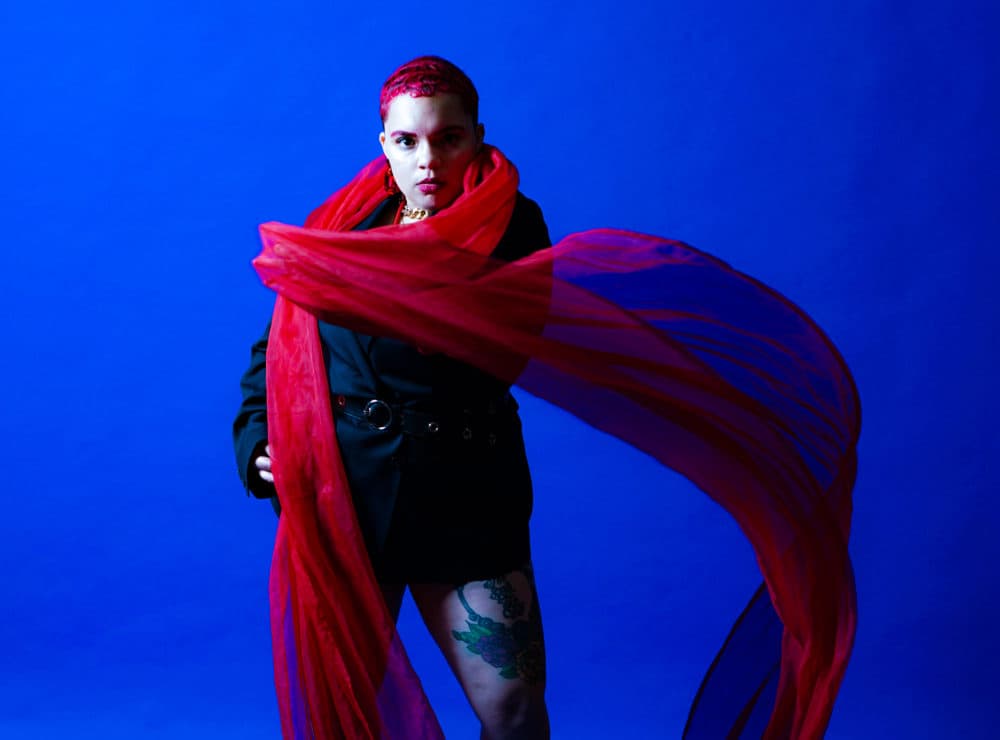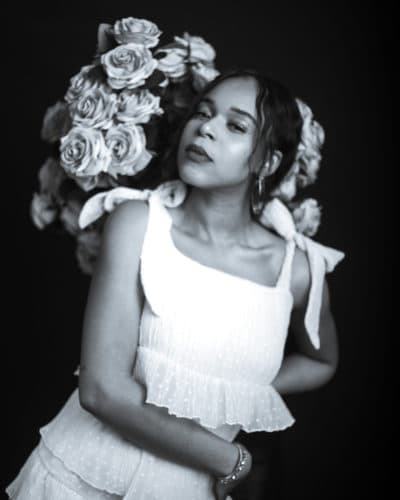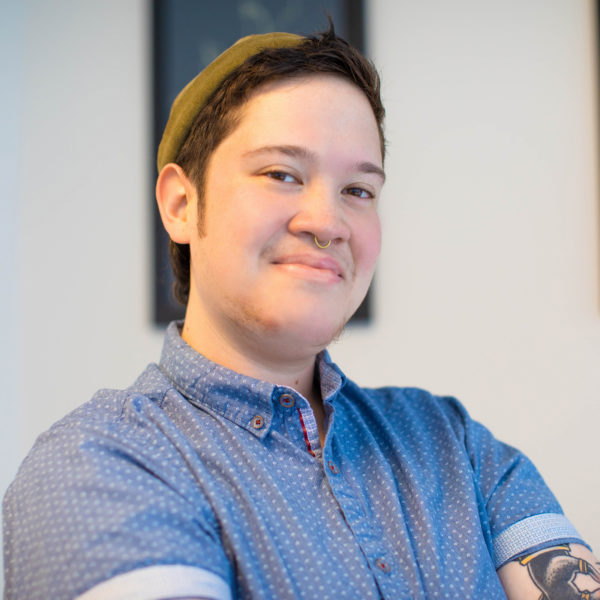Advertisement
'It’s A Love Letter': Photographer OJ Slaughter Puts History In The Hands Of Black Bostonians

"This my real name," states the one line Instagram bio of Boston photographer OJ Slaughter. The deceptively simple statement seems to ground an artist whose work is marked by its tendency to eschew the earthly constraints of reality for dreamy, conceptual worlds.
“I like that when you look at my work, it feels like you’re taking a step away from the craziness in the world in this moment,” says Slaughter, who is also an artist manager and creative director.
Slaughter, who identifies as a black, nonbinary (Slaughter’s pronouns are they/them), Jewish and queer person, struggled to find a sense of belonging during a small-town New Jersey upbringing. Taking photos of local subjects became their way of sending “a love letter.”
“It's my way of showing them that I respect them as a person, and I see them as so much more than the world that we're in right now,” Slaughter says. “Trying to place these people in this world that I've created has become a major theme of my work.”

Very few of Slaughter’s subjects are models, though you wouldn’t know it. Slaughter’s sensual, colorful captures, laced with playfulness and a little bit of magic, transform everyday scenes — from a grassy hill at Arnold Arboretum to a quiet reading room at the Boston Public Library — into glimpses of alternate realities where subjects dance, defy gravity and revel in the triumph of their own bodies.
It was Slaughter’s genuine love for the artistic community they’d found in Boston that inspired their current project: a series of portraits taken over the course of Black History Month, with pay-what-you-can shoots offered exclusively to black people.
Specifically, the idea came to them in a moment of social media-induced frustration.
“I was on Instagram, and I kept seeing all of these Black History Month promotions spread through the white gaze. A lot of, you know, ‘50 percent off of this!’ Just posts that are so capitalism-centered, almost making a mockery of it,” Slaughter says.
Advertisement
The experience on Instagram sparked Slaughter’s desire to put control of black narratives and contemporary history back into the hands of black people, rather than being forced to take in imagery that contorts the lived experiences of black people into exploitable fragments.
“I realized that the more and more I looked at photos, it was like, black people sitting at countertops getting stuff poured on them, or black people getting kicked out of pools,” Slaughter continues. “All of these images that we've seen our entire lives. Where are the photos of black people being happy? Where are the photos of black people being themselves? And what does that look like right now?”
The pay-what-you-can structure of the Black History Month project has brought up opportunities for Slaughter to work with people who might not otherwise see themselves and be seen in this way.
“I’ve had people come to me and be like, ‘I have $20. What can we do for $20?’ So then we have a conversation about like, ‘Who do you want to be? Who do you want to be seen as? When you look back at these in a couple of years, what feelings do you want from these photos?’ ” Slaughter says, casting some insight into their creative process. “I think that there are a lot of images of [black people] that have been negative and unnecessary because of the way other communities have portrayed us. But now we're taking this project and we're using it to put our history in our hands.”
In the weeks since Slaughter announced the project on their Instagram, they said they've been inundated not only with requests and ideas from models, but with donations from non-black supporters looking to make more shoots with Slaughter possible for those who wouldn’t otherwise have the means to pay. And the proceeds make more creation possible, whether funding the acquisition of props to bring a specific vision to life, or covering transportation.
“I love the idea of people giving back to the community who are outside of the community, because I don’t necessarily think that it’s black people’s job to ‘right’ history — and by that I mean R-I-G-H-T,” Slaughter says. “It's going to service our children and our grandchildren and great grandchildren and hopefully beyond that to be able to see positive images of what it's like being black in Boston in 2019."
On a personal note, the project has allowed Slaughter to connect with individuals in a way that feels to them like “therapy.” Each model brings their own presence and story, and Slaughter has found themself taking just as much from each project as they’re putting in, whether it’s engaging in “incredible conversation about what it was like growing up black and different” with one model, or drawing inspiration from another who’s a local Black Lives Matter activist. “I’m so excited to do justice to who he is,” they say of the latter.
Slaughter didn’t always identify as an artist — it was, in their words, “just fun” for a long time. They credit the people they’ve surrounded themself with in Boston that have uplifted, pushed, and inspired them to go further. With this project, they hope to spread the joy and power that they've discovered.
“Through powerful friendships and powerful relationships and a newfound relationship with my body and myself that I love, I've created almost this armor,” Slaughter says. “Black people, you know, they deal with one micro-aggression, one micro-aggression, one after the other, and then sometimes just plain aggression, in one day. I hope that it brings them to a place, even if it's just for a few seconds, where there's calm in their heart.”
